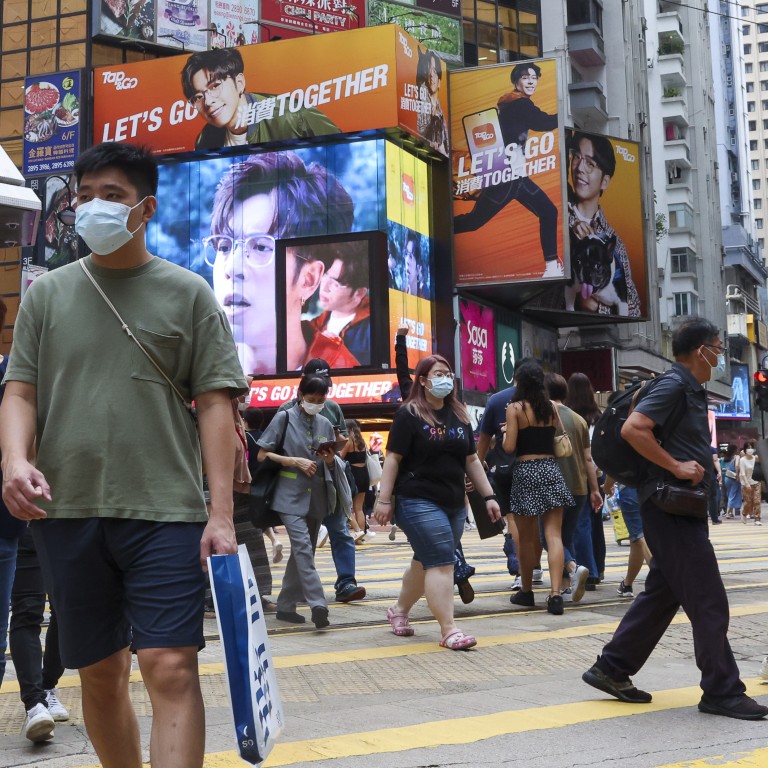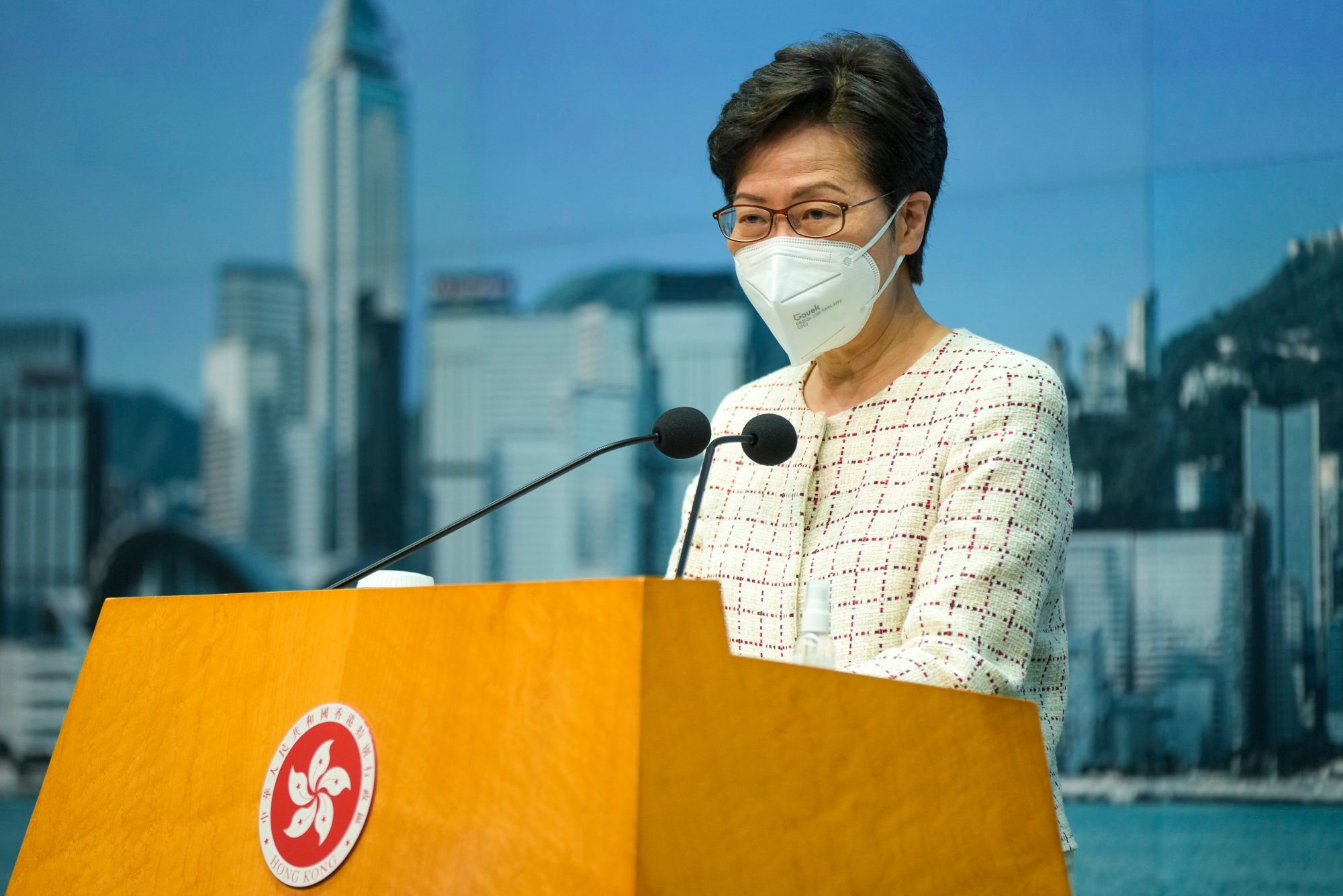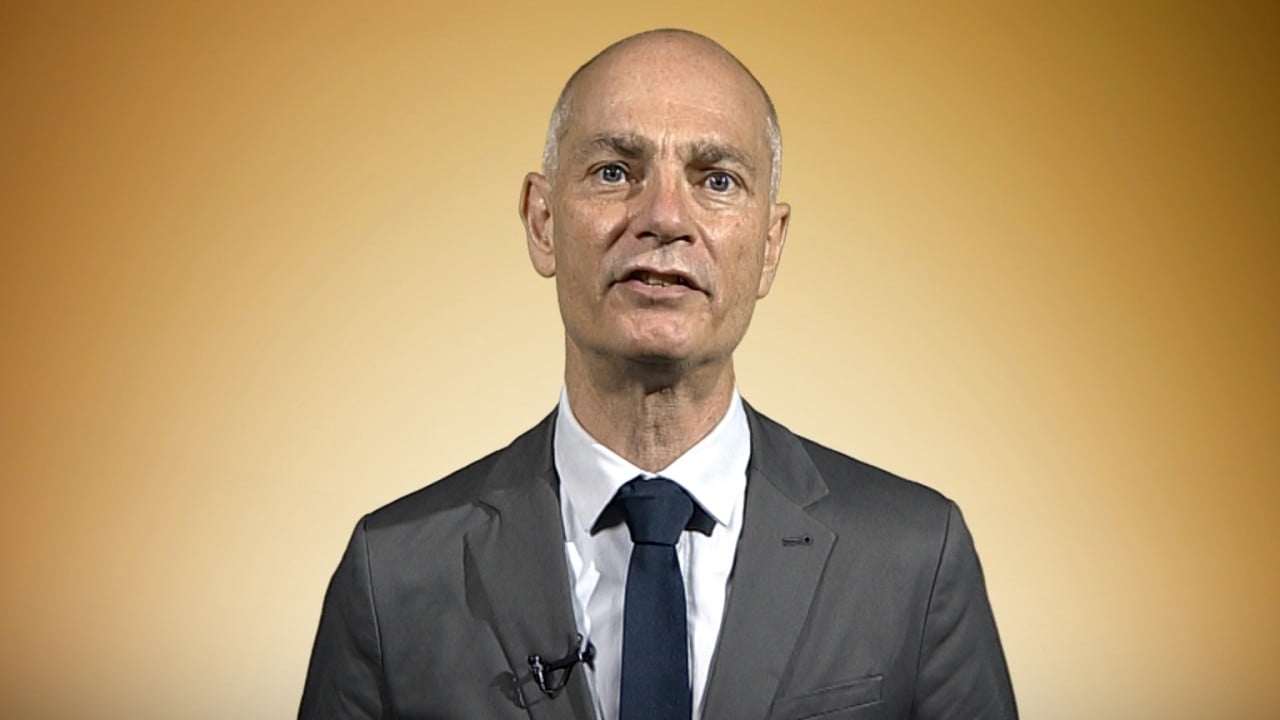
Coronavirus: too early to suggest arrival of sixth wave, Hong Kong leader Carrie Lam says, as she vows to facilitate arrival of state leaders
- Chief executive consults pandemic advisers on further measures, discusses preparations for sixth wave with internal high-level steering committee
- She also says city is eager to welcome state leaders for July 1 celebrations, but declines to comment on ‘closed-loop’ arrangement for local officials
Hong Kong’s outgoing leader has said it is still “too early” to suggest the city is facing a sixth Covid-19 wave, and has pledged that the government will “wholeheartedly devote itself to creating conditions” for state leaders to visit at the end of the month.
In light of the rising trend of infections this month, Chief Executive Carrie Lam Cheng Yuet-ngor consulted government pandemic advisers on Tuesday evening on other measures to be put in place.
Officials and experts discussed the city’s latest epidemic situation and coming trends during the meeting, and their assessment did not deviate from past evaluations, sources said, adding no concrete new measures were concluded.
Lam said her administration would work to facilitate the arrival of state leaders to Hong Kong, with a delegation expected to attend celebrations marking the 25th anniversary of the city’s return to Chinese rule.

“We are of course eagerly anticipating a visit by a state leader, and I believe that as so many things have happened in the past five years, there must be some important speeches to make on charting the course for the further development of Hong Kong,” Lam said at a press briefing before the weekly meeting of the Executive Council, her de facto cabinet.
“The government must wholeheartedly devote itself to creating conditions for state leaders to come, but I cannot reveal further details.”
On Tuesday, the city reported 489 new Covid-19 cases, including 52 imported ones. The caseload included 258 positive rapid antigen test (RAT) results that have been confirmed by polymerase chain reaction testing. Officials also received 72 positive RAT results from students and staff at 62 schools in the morning.
Three more virus-related deaths were also reported.
Experts warn of rebound in Hong Kong Covid cases, as city logs 543 infections
According to the Centre for Health Protection, the coronavirus-hit Shuffle nightclub reported 12 more infections, taking the total there to 97.
Kowloon Tong Funful English Primary School, which reported 12 cases on Monday, reported one more – a sibling of a student – on Tuesday, while Kiangsu & Chekiang Primary School (International Section) recorded seven infections involving five pupils and two staff in one class, which has been suspended for one week.
Lan Kwai Fong entertainment tycoon Allan Zeman told the Post that infections linked to nightspots accounted for only a fraction of the city’s daily caseload, noting the situation was “not the monster” that was portrayed by the media.
A Post calculation showed of the 4,494 local cases in the last two weeks, there were 283 tied to bars, amounting to 6.29 per cent.
“Society has just begun to return to normal, but now the industry is on edge again because of this talk of bar clusters,” he said.
Zeman also acknowledged that officials were unlikely to ease capacity restrictions for bars before July 1, when the new administration will take effect.
Lam conceded that authorities were concerned over the increase in the number of cases since the start of June, but several indicators, including hospital admission rates, remained reassuringly low.
“It is a bit too early to say that we are now confronting a sixth wave of Covid-19 because … a lot more indicators [are needed] to confirm the situation,” she said, adding she was unable to provide a “categorical answer”.
Public health experts had previously warned that Hong Kong could face a sixth coronavirus wave in late May or early June as social-distancing measures were relaxed.
However, they had estimated that the scale of the outbreak would be smaller than the fifth wave, with the number of patients requiring daily hospital care expected to peak in the hundreds.
Hong Kong has seen a rise in cases in recent weeks, including more than 280 infections linked to four bars or clubs in the city’s nightlife district. According to Centre for Health Protection data, the number of locally acquired infections has risen from around 1,500 in the week of May 24 to 30, to more than 2,900 in the following seven days.
Apart from meeting her health advisers on Tuesday for their latest assessment of the outbreak, Lam said she would also convene an internal high-level steering committee to prepare for a possible sixth wave, with a focus on protecting care homes for the elderly.
She also said the government would extend all current social-distancing rules and border control measures to the end of her term on June 30. The Food and Health Bureau will discuss with the chief executive-elect’s office whether measures should be extended after the next administration takes office.
Lam said, however, that she had not considered tightening measures at the moment, as the government had to take into account public health, the economy and the residents’ acceptance, adding she did not want to suspend in-person classes again as the cost would be too great.
Hong Kong snack chain Aji Ichiban shuts all 20 retail shops amid Covid-19 losses
At the same time, she said, authorities were considering ramping up testing for high-risk groups, while she had asked law enforcement departments to step up inspections at premises on a daily basis.
Local authorities also announced that starting from Tuesday, anyone who submitted a positive RAT result would also need to undergo a PCR test before their status was “confirmed”.
The announcement came after health authorities said on Monday that all residents who submitted positive RAT samples would have to undergo a polymerase chain reaction, or PCR, confirmation test. Those who failed to do so risked a HK$10,000 (US$1,275) fine and up to six months in jail if they were found to have deliberately submitted false information.
The decision was made after an increased proportion of people in such cases either tested negative the second time round or refused to provide specimens for checks.
Lam said recently about 30 per cent of cases on a particular day returned negative results after cross-checking.
Hong Kong official warns of rising Covid-19 infections as clusters at bars grow
Dr Chuang Shuk-kwan, head of the communicable disease branch of the Centre for Health Protection, said on Tuesday that it was “not so ideal” to remove cases that were later confirmed to be negative from the overall cases figure, so authorities had decided to change the reporting criteria.
However, Chuang said it would take time before authorities could announce how many cases had been removed from the city’s overall tally.
Respiratory medicine specialist Dr Leung Chi-chiu said the change in the daily reporting mechanism of Covid-19 cases could work, as its most important function currently was trend analysis rather than just recording the numbers.
“The daily caseloads may suddenly drop by a lot for the first few days but after the course correction, the new trend should become apparent,” he said.
Leung said the PCR tests should be done quickly, so residents could isolate themselves at home if needed to prevent a community spread.
The city’s infection tally now stands at 1,215,935, with 9,389 related fatalities.
Additional reporting by Tony Cheung



